Filter by

An Introduction to English Phonetics
Immediately I had agreed to write a book with the title ‘Introduction to the Phonetics of English’, I realised that describing the phonetics of ‘English’ is problematic because English is so phonetically heterogeneous. So the result is a book that is more about phonetics, with illus- trations from around the English-speaking world. It is not a complete description of any one variety;…
- Edition
- -
- ISBN/ISSN
- 978-0-7486-2540-6
- Collation
- -
- Series Title
- -
- Call Number
- 414.8 Odg a
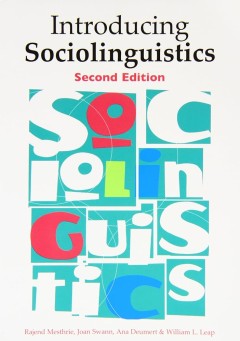
Introducing Sociolinguistics 2nd ed
We have aimed this book at readers who have little or no prior experience of linguistics. We have therefore tried to be as explicit as possible when using terms and conventions from linguistics, and have tried to keep them to a minimum. Such terms are explained in the Glossary. We have given in boldface (for example register) key concepts in sociolinguistics that readers should remember. L…
- Edition
- 2nd edition
- ISBN/ISSN
- 0-7486-3843-7
- Collation
- -
- Series Title
- -
- Call Number
- 306.44 Mes i

The Syntax of Early English
This book is a guide to the development of English syntax between the Old and Modern periods. Beginning with an overview of the main features of early English syntax, it gives a unified account of the grammatical changes occurring in the language during this period. Written by four leading experts in English historical syntax, the book demonstrates the ways in which syn- tactic change takes…
- Edition
- -
- ISBN/ISSN
- 0-511-03810-0
- Collation
- -
- Series Title
- -
- Call Number
- 425 Fis t
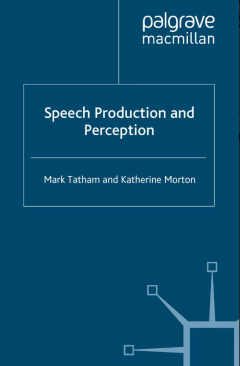
Speech Production and Perception
Until the middle of the 20th century phonetics was largely concerned with recording the sounds of languages and how they are made, together with making comparisons between the sound inventories of languages. We are still with that legacy in many ways. We compare surface events noted in one language with another, or note observations in spoken language and assign symbols with a system that …
- Edition
- -
- ISBN/ISSN
- 978–1–4039–1732–4
- Collation
- -
- Series Title
- -
- Call Number
- 414.8 Tat s
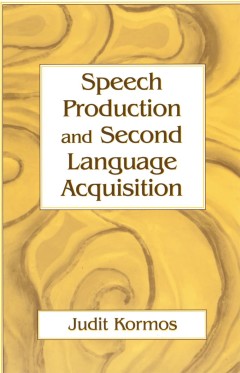
Speech Production and Second Language Acquisition
The Cognitive Science and Second Language Acquisition (CSSLA) series is designed to provide accessible and comprehensive coverage of the links between basic concepts and findings in cognitive science (CS) and second language acquisition (SLA) in a systematic way. Taken together, books in the series should combine to provide a comprehensive overview of the conceptual and methodological intersect…
- Edition
- -
- ISBN/ISSN
- 0-8058-5657-9
- Collation
- -
- Series Title
- -
- Call Number
- 418 Kor s

Phonology and Language Use
The idea for this book and the perception that it was needed arose in the context of the community of researchers who investigate the way language use gives rise to grammar. Indeed, it was these workers in usage-based functionalism, most notably my long-time friend Sandy Thompson, who first supported and encouraged a book that would show how principles that had been successfully applied to the …
- Edition
- -
- ISBN/ISSN
- 0-521-58374-8
- Collation
- -
- Series Title
- -
- Call Number
- 425 Byb p
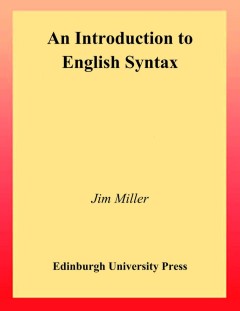
An Introduction to English Syntax
We study syntax because it enables human beings to compose complex messages. Suppose a disgruntled worker utters the single word idiot! He or she might have muttered stupid, unfeeling, ignorant idiot, with four words combined into a phrase. The speaker might even have said That stupid, unfeeling, ignorant idiot is the new manager!, in which the phrase the new manager and the phrase that st…
- Edition
- -
- ISBN/ISSN
- 0-7486-1254-8
- Collation
- -
- Series Title
- -
- Call Number
- 425 Mil a
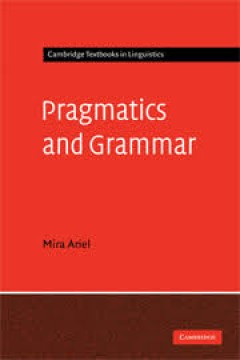
Pragmatics and Grammar
When using language, many aspects of our messages are left implicit in what we say. While grammar is responsible for what we express explicitly, pragmatics explains how we infer additional meanings. The problem is that it is not always a trivial matter to decide which of the meanings conveyed is explicit (grammatical) and which implicit (pragmatic). Pragmatics and Grammar lays out a method…
- Edition
- -
- ISBN/ISSN
- 978-0-511-42295-9
- Collation
- -
- Series Title
- -
- Call Number
- 425 Ari p
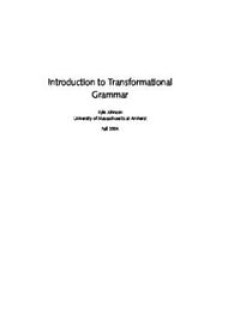
Introduction to Transformational Grammar
- Edition
- -
- ISBN/ISSN
- -
- Collation
- -
- Series Title
- -
- Call Number
- 415 JOH i
- Edition
- -
- ISBN/ISSN
- -
- Collation
- -
- Series Title
- -
- Call Number
- 415 JOH i
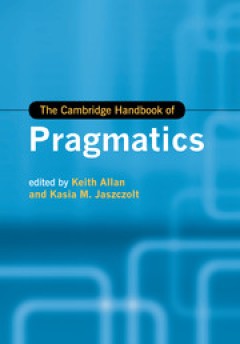
The Cambridge Handbook of Pragmatics
- Edition
- -
- ISBN/ISSN
- 978-0-521-19207-1
- Collation
- -
- Series Title
- -
- Call Number
- 401.45 All t
- Edition
- -
- ISBN/ISSN
- 978-0-521-19207-1
- Collation
- -
- Series Title
- -
- Call Number
- 401.45 All t
 Computer Science, Information & General Works
Computer Science, Information & General Works  Philosophy & Psychology
Philosophy & Psychology  Religion
Religion  Social Sciences
Social Sciences  Language
Language  Pure Science
Pure Science  Applied Sciences
Applied Sciences  Art & Recreation
Art & Recreation  Literature
Literature  History & Geography
History & Geography